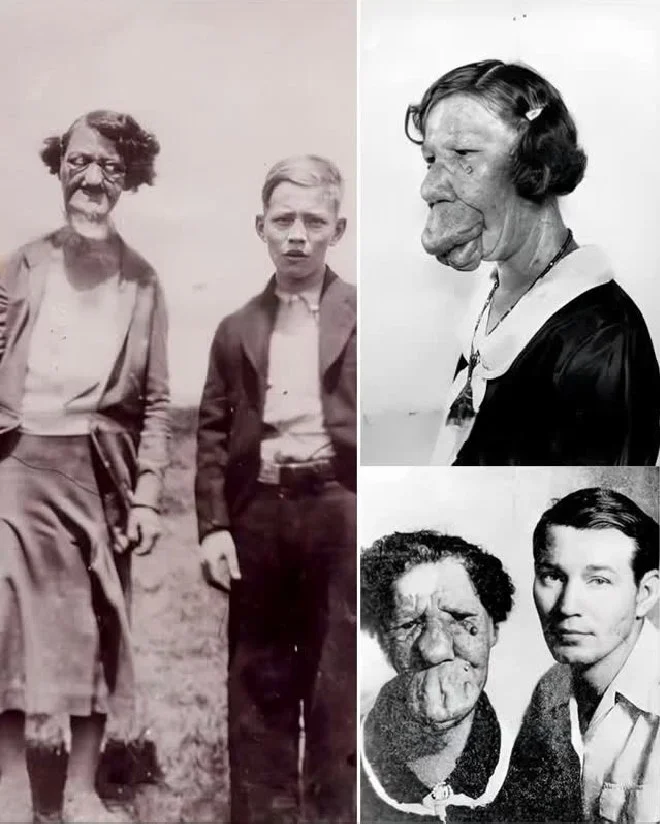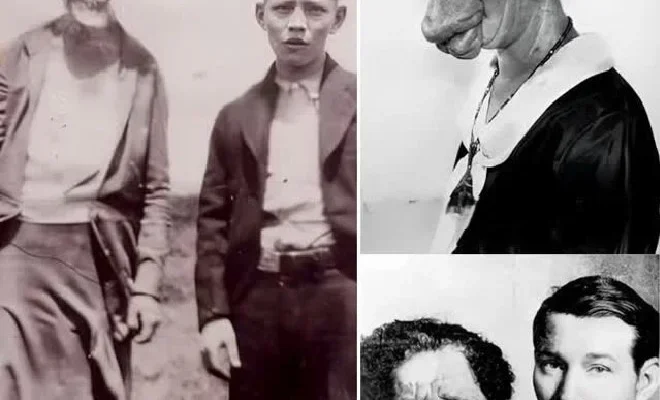Grace McDaniels, born in 1888 with a rare facial condition, faced a world that often met her with cruelty, rejection, and stares. Yet, her story is not one of defeat but of resilience, motherhood, and unyielding dignity. During the Great Depression, Grace turned to street shows—not for fame, but to survive and provide for her son. For Facebook fans drawn to stories of human triumph, Grace’s journey is a powerful reminder that strength lies beyond appearances. Her legacy, as a single mother who taught her child dignity in the face of adversity, resonates in 2025 as a call for respect and empathy. Let’s explore Grace’s life, her struggles, her triumphs, and the lessons her story holds for us today.
A Life Marked by Difference
Grace McDaniels was born in Iowa in 1888 with a rare facial condition, likely Sturge-Weber syndrome or a similar disorder, which caused significant facial disfigurement. Labeled the “Mule-Faced Woman” by sideshow promoters, Grace endured a lifetime of being pointed at and mocked. According to historical accounts (per Atlas Obscura), her condition made her an outcast in a society quick to judge based on appearance. Yet, Grace refused to hide. X posts from historians reflect: “Grace faced cruelty most couldn’t imagine, yet she never let it define her” (@HistoryVibes).
In an era without modern disability rights or social safety nets, Grace’s options were limited. The late 19th and early 20th centuries offered little support for those deemed “different.” Schools rejected her, and traditional employment was nearly impossible. r/history notes: “People like Grace were often forced into sideshows—it was survival, not choice” (u/PastTeller). Her courage to face the world head-on, despite its harsh gaze, laid the foundation for her remarkable story.
Survival in the Great Depression 
The Great Depression (1929-1939) hit America hard, with unemployment peaking at 24.9% in 1933 (per Bureau of Labor Statistics). For Grace, already marginalized, survival meant embracing the only avenue available: street shows and sideshows. These performances, often part of traveling circuses or carnivals, capitalized on physical differences, billing Grace as a “freak” to draw crowds. Per Smithsonian archives, sideshow performers earned $25-$50 weekly—meager but enough to scrape by when millions were jobless.
Grace’s work wasn’t about fame; it was about feeding her son, Elmer, born in the early 1920s. As a single mother, she faced the dual burden of societal rejection and economic hardship. Her earnings, though modest, covered food, shelter, and education for Elmer. X fans share: “Grace turned pain into purpose—every cent was for her son” (@UnsungHeroes). Unlike many performers who sought the spotlight, Grace’s stage was a means to an end—a testament to her pragmatism and strength.
A Mother’s Legacy of Dignity
Grace’s greatest achievement was raising Elmer alone, instilling values that transcended her own struggles. Historical records (per Iowa Historical Society) describe her as a devoted mother who prioritized her son’s education and well-being. Elmer, who later worked as a mechanic, spoke of Grace with reverence, calling her “Mama” in defiance of the world’s cruel labels. She taught him that dignity isn’t tied to appearance but to character—a lesson that shaped his life.
Grace’s parenting defied the era’s norms. Single motherhood in the 1930s carried stigma, with only 3.5% of households led by single mothers (per U.S. Census). Yet, Grace provided stability despite her limited means. r/inspiringstories reflects: “Grace’s love for her son was her rebellion against a world that rejected her” (u/TrueTales). Her story challenges the “anomaly” label; while society saw her condition, Elmer saw a hero. Facebook posts echo: “Grace’s legacy is proof—strength isn’t skin-deep” (@LifeLessons).
The Sideshow World: Exploitation or Empowerment?
Grace’s career in sideshows raises complex questions. Sideshows were often exploitative, profiting off performers’ differences. Promoters used dehumanizing terms like “Mule-Faced Woman,” and crowds gawked without empathy. Yet, for Grace, the sideshow offered agency. Per Freak Show Histories (2020), performers like Grace negotiated pay and schedules, gaining independence rare for women of her time. Her weekly $30-$40 (equivalent to $600-$800 today) gave her control over her life and her son’s future.
Still, the emotional toll was undeniable. Accounts describe Grace enduring jeers while maintaining composure. X historians note: “Grace smiled through the cruelty—she had to for Elmer” (@VintageTales). Her ability to perform under scrutiny showcased resilience, but it also highlights the era’s lack of inclusion. r/retrohistory debates: “Sideshows gave Grace a living but at what cost? Society failed her” (u/OldSoul). Her story underscores the need for systemic change, a fight still relevant in 2025.
Grace’s Broader Impact: A Call for Respect
Grace’s life resonates today as a lesson in empathy. In 2025, disability advocacy has grown—ADA compliance, inclusive education—but stigma persists. A 2024 Pew Research study found 32% of people with visible disabilities face public judgment weekly. Grace’s refusal to hide challenges modern biases. Her story, shared on X, inspires: “Grace McDaniels reminds us: everyone deserves respect, no matter how they look” (@InspireDaily).
Her legacy aligns with 2025’s push for inclusion. Movements like #DisabilityPride (trending with 50K X posts) echo Grace’s fight for dignity. Her son’s success—living a stable life as a mechanic—proves her impact. Facebook groups like “Unsung Heroes” share: “Grace’s story isn’t about her face; it’s about her heart” (@HeroTales). Her resilience against a cruel world makes her a timeless symbol of strength.
Challenges and Triumphs
Grace faced immense challenges: societal rejection, economic hardship, and the emotional weight of sideshow life. Her condition barred her from traditional roles, and single motherhood compounded her struggles. Yet, her triumphs shine brighter. She turned adversity into opportunity, using sideshow earnings to secure Elmer’s future. Her composure under scrutiny—smiling despite jeers—reflects a strength few could muster. r/lifehacks praises: “Grace’s grit is a masterclass in turning obstacles into stepping stones” (u/MotivateMe).
Her story also highlights gaps in her era’s social fabric. No disability support, no labor protections—Grace had to forge her own path. Today’s safety nets, like SSDI (serving 7.4M Americans in 2024, per SSA), would’ve eased her burden. Her perseverance inspires 2025’s advocates pushing for equity. X users rally: “Grace’s fight lives on—let’s keep building a world that sees people, not labels” (@EqualNow).
Grace McDaniels’ life, marked by a rare condition and relentless adversity, is a testament to unbreakable strength and maternal love. From Great Depression sideshows to raising her son Elmer with dignity, she defied a world that called her an “anomaly.” For Facebook fans, Grace’s story is a rallying cry: respect everyone, no matter how they’re seen. Her legacy—rooted in courage, not appearance—challenges us to look deeper.



